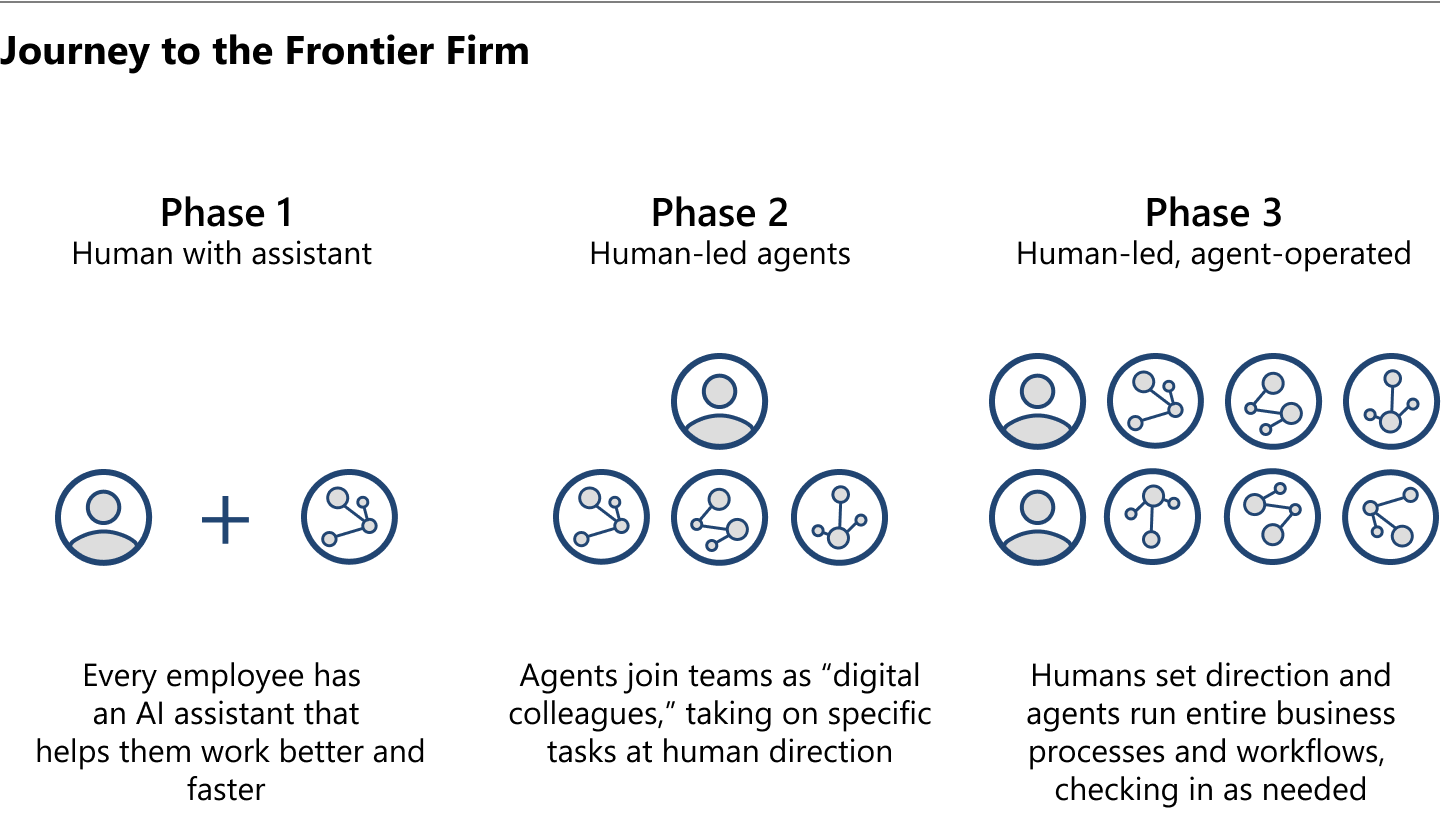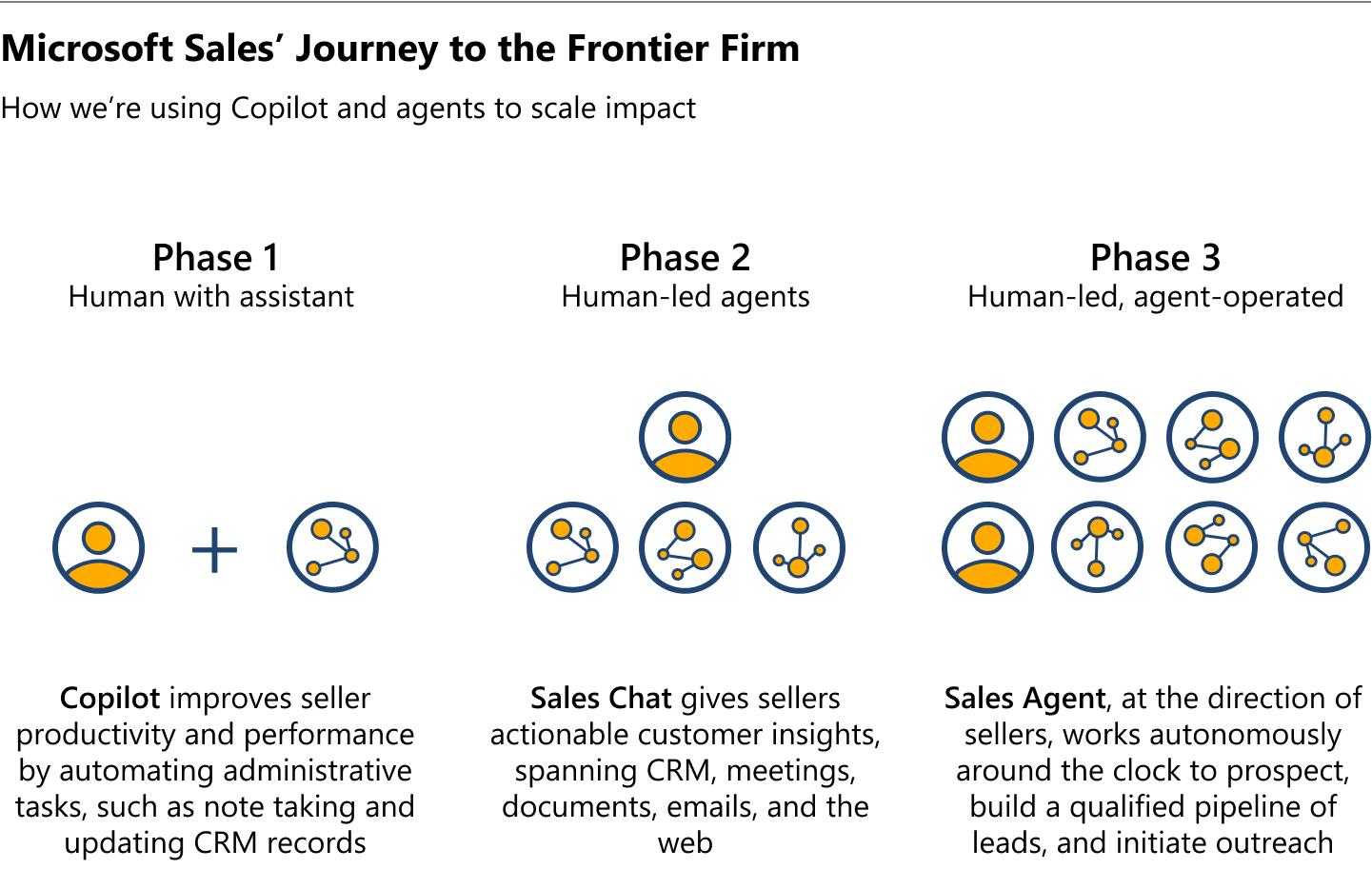Illustration by Alex Robbins
Think about stepping onto a steamship alongside the Hudson River in 1900, setting off on a transatlantic journey that can take a full week. You flip to a fellow passenger and say, “In just some many years, this similar journey will take seven hours—and we’ll do it within the sky.” You’d seemingly be met with well mannered disbelief, perhaps even a chuckle. The thought would sound extra like fantasy than foresight. And but, that’s precisely what occurred. What as soon as appeared not possible shortly grew to become the brand new regular.
And that’s about to occur with AI and enterprise, however with as soon as unimaginable progress compressed into just a few years as a substitute of many years. Many organizations are within the preliminary part of AI transformation, with people tapping AI as an assistant. Some have already reached the second part, forming groups of people and brokers working collectively towards widespread targets.
However part three, the Frontier Agency, the place people empower AI to turn out to be the operational engine of enterprise—and brokers turn out to be the first producers of labor—is tougher to check. It’s “imagining the not possible” territory. And the primary barrier to getting there’s not the boundaries of expertise; it’s the problem of imagining a completely new approach to work and construction organizations, then determining the best way to execute that transformation.

The three phases of AI transformation
As we mentioned final month within the 2025 Work Development Index Annual Report, we see organizations transferring via three phases on their approach to turning into completely new companies, powered by intelligence on demand. Data staff will not deal with all information work, with brokers executing increasingly more of it. Human roles will refocus round imaginative and prescient, technique, relationship constructing, and managing brokers.
At Microsoft, we’re not simply speaking about this transformation—we’re residing it. Our gross sales group is actively navigating all three phases without delay. By testing and scaling new instruments like Microsoft 365 Copilot, Gross sales Chat, and our autonomous Gross sales Agent, we’re studying what works, the place the friction factors are, and the best way to evolve each our expertise and our methods of working. These inside experiences are serving to us refine the trail ahead—not only for ourselves, however for each group on this journey.
“The core of what makes an excellent vendor hasn’t modified,” says Pam Maynard, our Chief AI Transformation Officer for Microsoft Industrial. “They deeply perceive the client’s context, priorities, and ache factors, after which map our options to these wants.” More and more, that can come from hybrid groups of people + brokers.
Part 1: Human with assistant
Each worker makes use of AI as a private assistant to work higher and quicker—writing, analyzing knowledge, producing code. That is about productiveness on a private degree reasonably than group or organizational. At scale, the influence means organizations working in the identical approach, utilizing the identical processes however extra effectively. In part one, people nonetheless drive the work.
For our gross sales group, this step has centered on high-volume duties: the executive work that sellers typically repeat dozens of instances a day, like updating CRM data or taking assembly notes. “Copilot tackles the executive trivia so sellers can spend extra time connecting with prospects,” Maynard says.
The outcomes? One gross sales group of practically 700 individuals has already reported 9.4% larger income per individual and 20% extra offers closed in comparison with their friends with decrease Copilot utilization1—concrete positive aspects that present how AI is driving actual enterprise outcomes.
Part 2: Human-agent groups
Brokers be part of the group as digital colleagues, taking up particular duties at human route—triaging assist tickets, dealing with challenge administration, facilitating conferences, contributing to brainstorming periods. Brokers enhance effectivity and productiveness on the group degree, increase workers with new expertise, and free them as much as tackle new, extra beneficial duties.
At Microsoft, this shift is embodied in Gross sales Chat, an extension of Copilot that brings wealthy CRM and gross sales context straight into the vendor’s workflow. As a substitute of toggling between dozens of instruments to organize for a buyer assembly, sellers can now get on the spot entry to detailed account and alternative info, together with licensing particulars, renewal timelines, and key decision-makers. It additionally surfaces high-level account summaries and income breakdowns, provides real-time teaching, and gives predictive insights to forecast deal outcomes and counsel subsequent steps. “Earlier than Gross sales Chat, sellers needed to swivel between 20 totally different instruments simply to get the complete image,” Maynard says. “Now they will merely ask, ‘What do I have to know earlier than my assembly with this buyer?’ and get the whole lot in a single place. It factors them straight to the highest-value motion they will take.”
Part 3: Human-led, agent-operated
People outline technique and assign targets to brokers. These brokers work largely with different brokers to carry out advanced operations, escalating points to people for steerage when mandatory. Brokers will design workflows and even consider each other. People will monitor their progress via dashboards that summarize agentic actions, intervening just for important selections. We’ll see the emergence of a brand new profession alternative for people within the AI age: agent supervisor, charged with constructing, delegating to, and supervising digital colleagues.
Progress via these phases gained’t essentially be linear—many firms will discover themselves in a couple of on the similar time—and there can be a “jagged frontier” of AI transformation as you roll out part three approaches throughout initiatives and groups. That’s a part of progress, in any case—individuals crossed the Atlantic by way of steamship properly past the daybreak of the aviation age.
The part 3 frontier
Letting go of a extra hands-on human position in day-to-day operations will really feel daunting—particularly in these early days. And being the primary mover will all the time really feel dangerous, however granting machines such unprecedented autonomy requires a brand new degree of belief in our instruments, and an understanding of what they will and can’t do properly.
However with a bit creativeness you’ll be able to transfer ahead boldly and with manageable danger by taking a step-by-step strategy: experimenting on low-stakes initiatives, verifying that they’re working properly, documenting your learnings, after which scaling them.
For instance, many firms rent gross sales growth representatives to do the mandatory however repetitive work of prospecting potential prospects. An agent can tackle that entry-level job in a territory the place you weren’t planning to rent a human anyway. It’s the distinction between hiring a digital employee—and discovering worth in an in any other case uncovered market—or no employee in any respect.
Our gross sales group makes use of our new Gross sales Agent to deal with precisely that kind of labor. It may possibly analysis leads, arrange conferences, and e mail prospects. A human vendor takes over when it’s time to shut the deal, identical to they’d with any early-in-career gross sales growth rep. (Ultimately, the agent will be capable to shut the deal itself.)
We’ve began in our small-to-medium enterprise phase, the place the size of alternative far exceeds what human sellers can cowl. “There’s completely zero probability we might successfully cowl that chance with people,” Maynard says. “It’s not about changing sellers—it’s about unlocking worth that was beforehand out of attain.” Many of those prospects are already utilizing Microsoft merchandise however haven’t had a direct relationship with a vendor. Gross sales Agent adjustments that, proactively figuring out wants, providing tailor-made options, and enhancing the client expertise in a approach that’s each scalable and cost-effective. In simply the previous three months, the agent has reached out to 36,000 prospects to generate gross sales leads, changing 10.4% into gross sales alternatives.2
Part three continues to be early days for us. Even so, the shift is already giving rise to a brand new idea: the AI territory. “In a standard territory, you assign a vendor. In an AI territory, you assign an agent that may function independently and ship worth,” Maynard says. “It’s a brand new enterprise mannequin for scale.”

A brand new perspective on AI and belief
It’s properly established that we readily settle for the dangers that include human errors whereas holding machines to a a lot larger commonplace (self-driving vehicles, for instance). Within the context of enterprise, we fear AI would possibly say or do the incorrect factor, although we tolerate these similar flaws in individuals daily. This uneven danger tolerance deserves examination, particularly since AI techniques can already do way more than we allow them to.
Think about how OpenAI o3’s skill to cause has introduced breathtaking progress on key intelligence benchmarks. With AI growing so quickly, is it extra of a danger to take a leap or to maintain ready? Bear in mind: firms have numerous techniques in place to mitigate danger brought on by people, they usually can and can develop them for AI as properly.
What’s extra, no firm is touring the trail to turning into a Frontier Agency for its personal sake. Part three–type transformation gained’t simply influence organizational buildings; it should additionally drive progress. As you progress via this journey, the price of human labor will lower whereas digital labor prices rise, albeit marginally. Over time, new income streams will emerge, resulting in an general enhance in revenue margins.
Part three means transferring from directing individuals to designing techniques. Management, in the meantime, shifts past managing individuals to orchestrating efficiency. To get began, check a brand new strategy: select one course of in an space of low danger and powerful potential, and take a look at making it agent-led.
Worrying concerning the unknown is comprehensible. However the true danger right here is inaction. The groundbreaking Frontier Corporations that can reimagine information work and dominate their industries within the coming decade are already pulling forward.